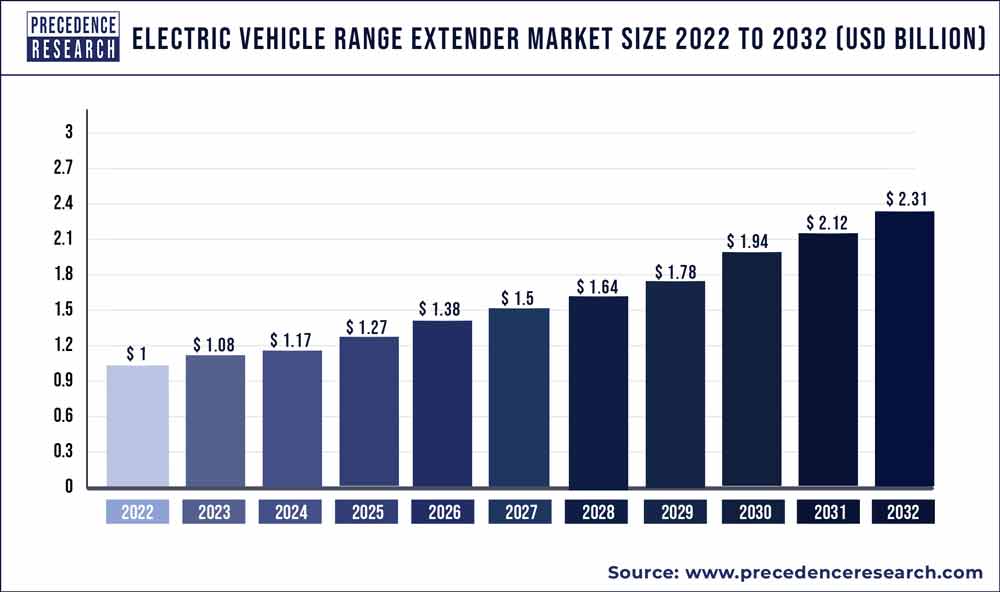The global electric vehicle range extender market size was valued at USD 1.08 billion in 2023 and is expected to hit around USD 2.31 billion by 2032, at a CAGR of 8.80% from 2023 to 2032.

The Electric Vehicle (EV) Range Extender Market is witnessing significant growth propelled by the rising demand for electric vehicles worldwide. As the automotive industry shifts towards sustainable transportation solutions, the need for extending the range of EVs has become paramount. Range extenders play a crucial role in addressing range anxiety among consumers, thereby accelerating the adoption of electric vehicles.
Get a Sample: https://www.precedenceresearch.com/sample/1619
Growth Factors:
Several factors contribute to the growth of the EV range extender market. Technological advancements in battery technology and the increasing efficiency of range extender systems have enhanced the driving range of electric vehicles, thereby boosting consumer confidence. Additionally, government incentives and regulations promoting the adoption of electric vehicles are driving the demand for range extender solutions.
Region Insights:
The EV range extender market exhibits regional variations influenced by factors such as infrastructure development, government policies, and consumer preferences. Regions with robust EV infrastructure and supportive regulatory frameworks, such as North America and Europe, witness significant adoption of range extender technologies. Emerging markets in Asia-Pacific, including China and India, are also experiencing rapid growth driven by increasing awareness of environmental sustainability and government initiatives to curb emissions.
Electric Vehicle Range Extender Market Scope
| Report Coverage | Details |
| Market Size by 2032 | USD 2.31 Billion |
| Growth Rate from 2023 to 2032 | CAGR of 8.80% |
| North America Market Share in 2022 | 45% |
| Passenger Vehicle Market Share in 2022 | 85% |
| Base Year | 2022 |
| Forecast Period | 2023 to 2032 |
| Segments Covered | Product, Vehicle, Component, Geography |
Drivers:
Key drivers shaping the EV range extender market include the growing awareness of environmental sustainability, advancements in battery technology, and the need for reducing greenhouse gas emissions. Moreover, improvements in the charging infrastructure and the expansion of renewable energy sources contribute to the proliferation of electric vehicles equipped with range extenders.
Opportunities:
The EV range extender market presents several opportunities for industry players to capitalize on. Collaborations and partnerships between automotive manufacturers, technology providers, and energy companies can facilitate innovation and the development of cost-effective range extender solutions. Additionally, expanding into untapped markets and diversifying product offerings to cater to different vehicle segments represent avenues for growth.
Challenges:
Despite the promising growth prospects, the EV range extender market faces challenges such as high upfront costs, limited infrastructure for alternative fuels, and concerns regarding the environmental impact of range extender technologies. Additionally, the integration of range extender systems into existing vehicle architectures poses engineering and design challenges for manufacturers.
Read Also: Electric Bus Market Size to Surpass USD 85.99 Billion by 2032
Competitive Landscape: The competitive landscape of the EV range extender market is characterized by intense competition among key players striving to innovate and gain a competitive edge. Established automotive manufacturers, technology companies, and startups are investing in research and development to enhance the efficiency and performance of range extender systems. Strategic alliances, mergers, and acquisitions are prevalent strategies employed by companies to strengthen their market presence and expand their product portfolios.
Key Developments
- The investors are focusing towards electric vehicle companies to fund on hydrogen power in the electric vehicle range extender market and Hyzon Motors will receive USD 570 million from SPAC in February 2021, backed by fuel cell technology. This collaboration will focus on new product development.
- Robert Bosch GmbH boosted its equity participation in Ceres from c.4 percent to c.18 percent in January 2020, according to Ceres Power Holdings PLC, a global producer of low-cost solid oxide fuel cell technology.
Electric Vehicle Range Extender Market Companies
- Nissan
- Delta Motorsport
- Magna International
- General Motors
- Ballard Power Systems
- Mahle
- Ceres Power
- BMW
- Rheinmetall
- Plug Power
Segments Covered in the Report
By Product
- ICE Range Extender
- Fuel Cell Range Extender
- Others
By Vehicle
- Passenger vehicles
- Commercial vehicles
By Component
- Battery pack
- Automotive
- Power Converter
- Electric Motor
By Geography
- North America
- U.S.
- Canada
- Europe
- U.K.
- Germany
- France
- Asia-Pacific
- China
- India
- Japan
- South Korea
- Malaysia
- Philippines
- Latin America
- Brazil
- Rest of Latin America
- Middle East & Africa (MEA)
- GCC
- North Africa
- South Africa
- Rest of the Middle East & Africa
Contact Us:
Mr. Alex
Sales Manager
Call: +1 9197 992 333
Email: sales@precedenceresearch.com
Web: https://www.precedenceresearch.com
Blog: https://www.expresswebwire.com/
Blog: https://www.uswebwire.com/
Blog: https://www.dailytechbulletin.com/
